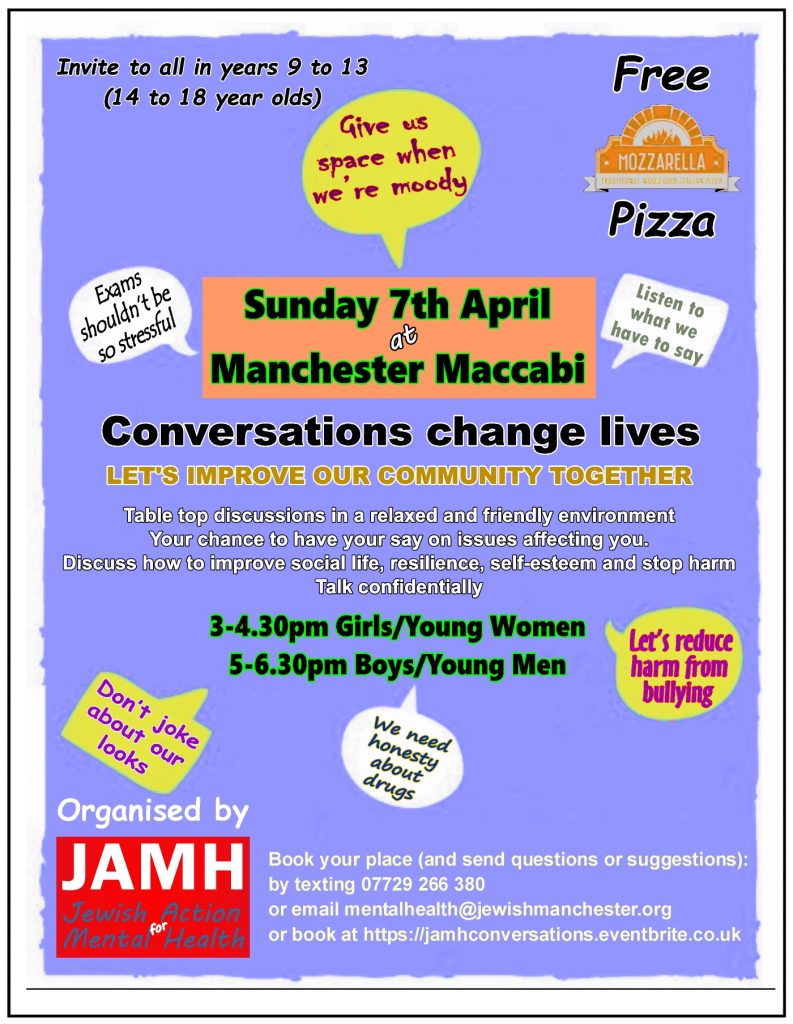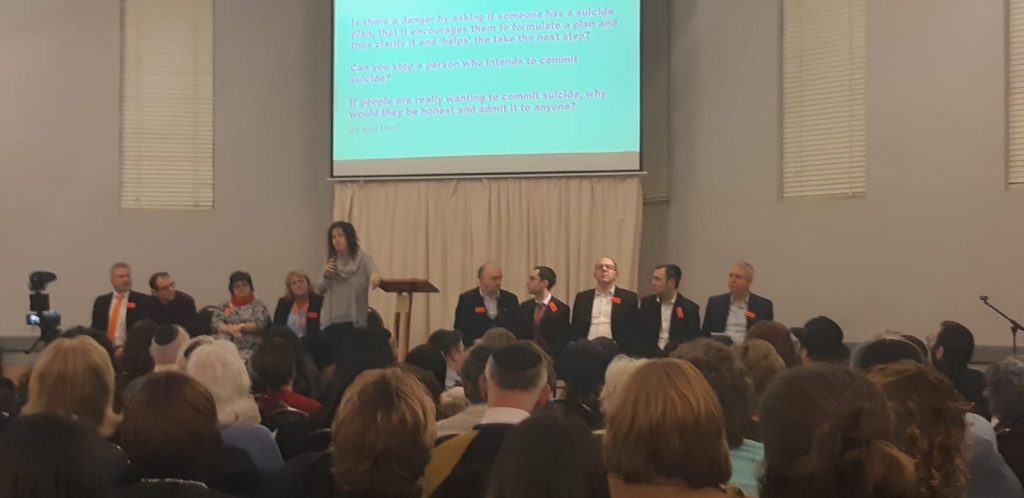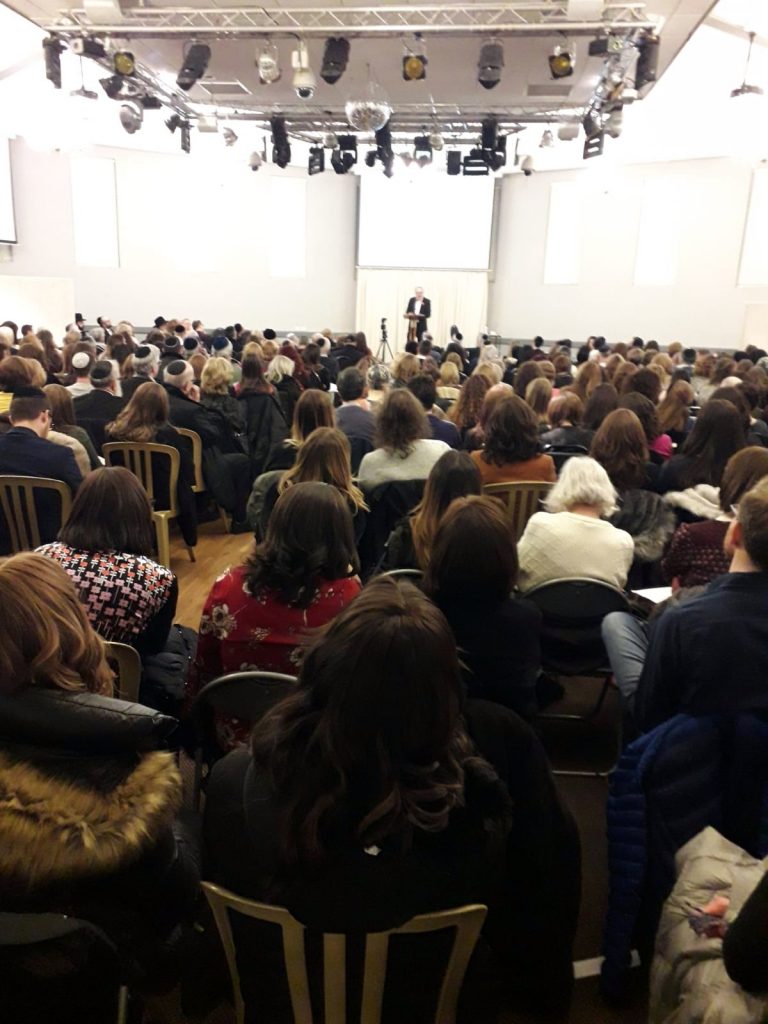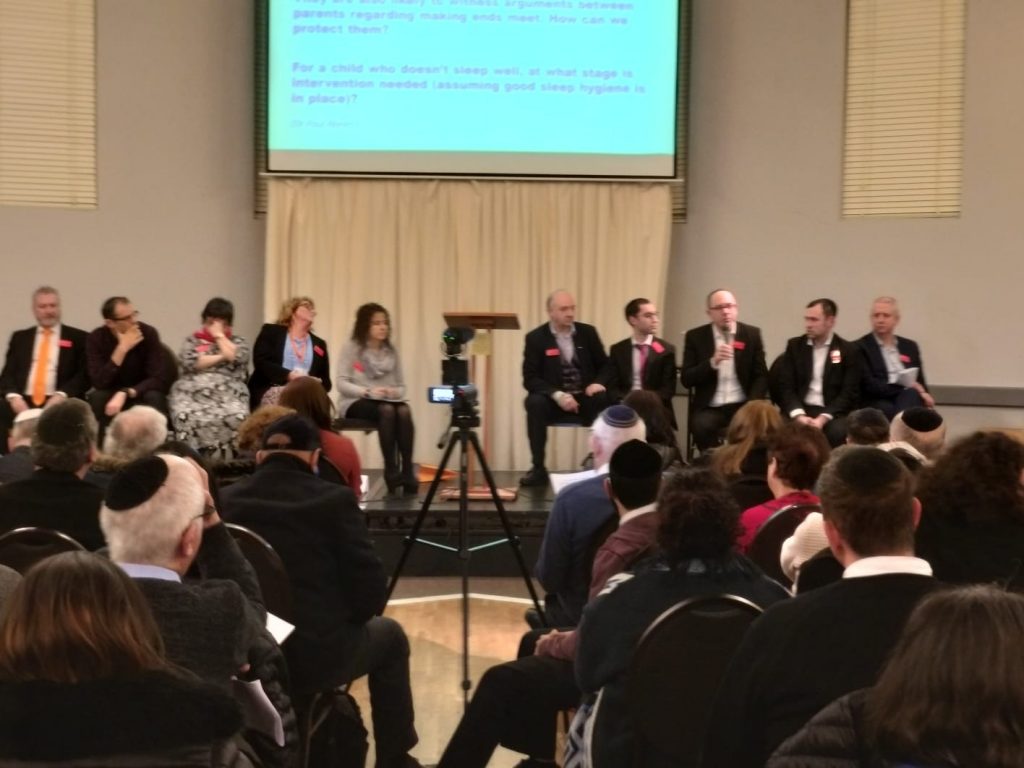Jewish Action for Mental Health promised the community a youth event before Pesach. The event being run on April 7th is to bring teens in to let us know what issues they are facing and what they want from us as a group. What programmes, activities and projects they want us, and partners, to deliver, over which subject areas and how they would like to be involved.
This is an opportunity for young people to have their voice and influence what happens to support them. We’ll also be providing free pizza!
There will be two sessions on the day for females/males to ensure sensitivities affecting each gender can be addressed.
There will be ’round table’ discussions and a “What to I do if….” input from a mental health professional, which will give information on support if being bullied/cyber bullied, a friend is self harming/depressed/suicidal etc.
Please share this information with young people age 14-18 and also to any aged 19 to 20s who may want to help facilitate tables. Those wanting to help facilitate should email [email protected] or text 07729 266 380.
Book a place (and send questions or suggestions) by texting 07729 266 380 or book at https://jamhconversations.eventbrite.co.uk.


You can download presentations from the evening at the bottom of this page
Five hundred people, from across the spectrum of the Manchester Jewish community, attended the tremendously successful Action for Mental Health event on Motzei Shabbat. The event, which took place at the Hilton Suite, saw the hall filled to its capacity with parents, professionals and others eager to understand more about young people’s mental health.
Dr Sandi Mann, the event’s instigator and coordinator, said, “I was overwhelmed by the incredibly positive response from the community before, during and after the event. We are committed to continuing this initiative for the well-being of all our community, both young and older.”

Several people were turned away from 15 minutes after the event started, which Dr Mann said, “Was really upsetting but was due to exceeding fire capacity and we had to put safety first.”
The event aimed to increase awareness of mental illness in the Jewish community and offer practical guidance in identifying signs and symptoms of acute psychological distress, what to do about it and how to cope with the aftermath of a traumatic event. The chronology of this process was reflected in the order of the six mental health professionals who delivered sessions and in the topics that each presented.
Michelle Ciffer, Manager of the Hershel Weiss children and family centre, opened the evening, reflecting on its true cross-communal nature both in terms of the organisations supporting it and the attendees.

Dr Paul Abeles then explained how to promote positive mental health, in view of the pressures faced by today’s young people. Dr Sandi Mann followed this with guidelines on assessing suicide risk and on what signs and symptoms accompany low mood or depression.
Debra Frazer of Six Degrees then mapped the processes and pathways available for accessing help and support, both in the community and outside. Daniel Nissen of Neshomo provided guidance on how to talk to someone in acute psychological distress.
A summary of possible treatment options and their outcomes was then provided by psychiatrist Dr James Glass. Rabbi Dov Benyaacov Kurtzman of Heads Up ran an interactive workshop on coping after a traumatic event.
Rabbi Daniel Walker then spoke of the communal and individual responsibility of all present, stressing the importance of encouraging children to be kind and accepting of everyone, even if someone is different or ‘weird’. This was followed by a call for temptation to carry out their own isolated initiatives and, instead, combine efforts and resources in order to benefit the whole community.
All of the speakers were then joined by The Fed’s Bernie Garner and consultant paediatrician Dr Robert Block, to form a Q&A panel which was chaired by Jonny Wineberg of the Jewish Representative Council. Questions were submitted throughout the evening by audience members and covered a wide range of topics including queries about whether local Jewish schools are putting too much academic pressure on pupils contributing towards mental ill health; how parents can take preventative measures to stop self harm; how children could be protected from family financial stresses; and the lack of awareness amongst SENCOs of how to respond to mental health issues.

Dr Sandi Mann, concluded the evening with a powerful speech in which the message that: “When it comes to mental health, we do care” reverberated around the walls of the hall. She also announced that further events for young people as well as the wider community were in the planning with a strategy group taking the initiative forward. Any organisations not yet part of the initiative who wish to get involved should email [email protected]
ENDS
For immediate release.
For more information on this release, please email [email protected].
